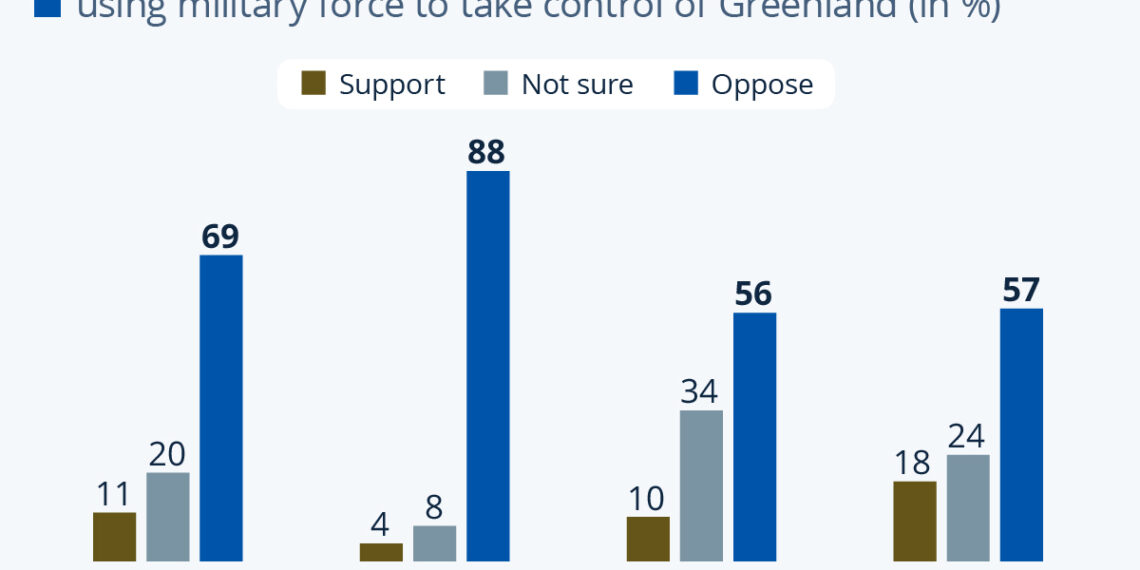Select Language:
U.S. Delegation’s Visit to Greenland: Mixed Reactions and Political Implications
Overview of the Visit
A recent planned trip by a U.S. delegation to Greenland has stirred controversy and led to significant backlash from Greenlandic leaders. The delegation, headed by U.S. Second Lady Usha Vance, included national security advisor Mike Waltz and energy secretary Chris Wright. The group intended to celebrate what was described as a "long history of mutual respect and cooperation" between the United States and Greenland. Their agenda involved visiting a U.S. military base and engaging in local cultural activities, such as a dogsled race.
Greenlandic Leaders Respond
Despite the friendly motives conveyed by U.S. officials, the reception in Greenland was far from warm. The outgoing Prime Minister of Greenland, Mute Egede, characterized the U.S. visit as "highly aggressive" and a "provocation." He expressed concerns regarding the presence of national security advisor Waltz, questioning his role in a visit that he perceived as an assertion of power over Greenland. Egede’s remarks highlight the sensitivity surrounding Greenland’s autonomy and its relationship with Denmark, which holds sovereignty over the territory.
Context of Tensions
The tensions surrounding the U.S. delegation cannot be overlooked, particularly in light of former President Donald Trump’s previous remarks regarding Greenland. In his first address to Congress, Trump reiterated his interest in acquiring Greenland, framing it as a matter of "national security and even international security." His declarations included a direct appeal to the "incredible people of Greenland," promising them safety, wealth, and autonomy in determining their future.
Trump’s threats to "get" Greenland "one way or the other" raised alarms, especially considering the implications of such statements on international relations and sovereignty issues. As Prime Minister Mette Frederiksen of Denmark noted, the visit cannot be viewed in isolation from the concerning rhetoric surrounding Greenland’s status.
Public Sentiment in the United States
Despite the provocative nature of the situation, recent polling data reveals that American public opinion is largely opposed to the notion of wielding military force to take control of Greenland. A YouGov survey conducted on behalf of The Economist found that 69% of U.S. adults disapprove of the idea, with only 11% in support. This dismay is not limited to the general population; even among Republicans, 57% expressed opposition to the military acquisition of Greenland.
The Role of NATO and International Relations
The geopolitical implications of forcibly acquiring Greenland are significant. Denmark, a NATO member, presents a formidable barrier against any attempts at forcible control. An assault on Danish sovereignty would not only disrupt the regional balance but could also incite a broader international crisis. The commitment of NATO allies to collective defense means that any military action against Denmark (and by extension, Greenland) would be met with unified resistance.
Greenland’s Autonomy and Future
Greenland’s political landscape is unique; as an autonomous territory, it possesses its own government and a distinct cultural identity separate from Denmark. The aspirations of Greenlanders to define their own political future underscore the importance of recognizing their autonomy in international discussions. The rhetoric from U.S. leaders suggesting takeover or control has historically been met with fierce resistance from both local leaders and the broader Greenlandic population.
The relationship between the U.S. and Greenland, underpinned by military alliances and shared strategic interests, necessitates careful navigation to avoid misunderstandings and foster goodwill. The recent visit by U.S. officials, despite its intentions, paints a complex picture of diplomatic relations infused with both historical ties and contemporary challenges.
Conclusion
This blog entry serves to unpack the intricacies of U.S.-Greenland relations amidst rising tensions and varying perceptions of sovereignty and autonomy. With strong public sentiment against military intervention and a landscape of diplomatic sensitivities, the path forward will require dialogue rooted in respect and acknowledgment of Greenland’s self-determination.







